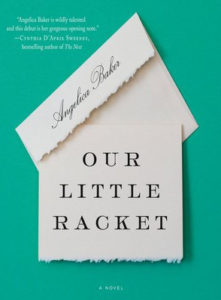On the Periphery of Scandal: A Review of ‘Our Little Racket’ by Angelica Baker
By Alexis Shanley
Posted on

There’s a scene in Angelica Baker’s debut novel, Our Little Racket, where the underaged daughter of a fallen financial tycoon escapes her Greenwich, Connecticut community and runs off to New York City. She’s looking for a reprieve from the suffocating attention her family is under and winds up at a noisy bar. It has an underlying din dominated by male voices and interspersed with female shrieks in reaction to them. The moment is an apt metaphor for this book and its rumination on the ways in which women can become the collateral damage of scandal. In this novel, the men at the root of the story create chaos and then proceed to exist in shadows, while the women are positioned to be reactive, left to process the situation they’ve inherited and face societal scrutiny head-on.
Baker’s book takes a traditionally male-dominated tale and shifts focus away from the man directly involved. It tells the story of Bob D’Amico, the CEO of an investment bank that has collapsed, as he faces allegations of malfeasance. Instead of following the intricacies of the scandal, Baker takes us through the reverberations of it through the perspective of five women in Bob’s life. Our points of entry include his wife Isabel, their teenage daughter, Madison, two of their friends, and the family’s nanny. All of the women have a different relationship to—and image of—Bob. They come from different backgrounds and social standing, have different levels of wealth and privilege, and are affected by Bob’s downfall to varying degrees. When woven together, their perspectives help the reader piece together an understanding of what transpired as secrets and obfuscations come to light.
I was about halfway through reading Our Little Racket when Anthony Weiner pled guilty to sexting a minor. Media coverage was rampant, and I couldn’t stop thinking of Huma Abedin. The first handful of articles my Google search for Anthony Weiner pulled up had headlines criticizing her for letting him back into their home; another article brought in a clinical psychologist who never treated her but didn’t let that stop him from calling her “codependent” and speculating that she has some kind of Stockholm Syndrome. Our Little Racket made me consider the women involved with the men behind public scandals, as well as how a disgraced man’s actions extend to tarnishing his wife’s reputation by association. Anthony Weiner gets ridiculed and dismissed as a clown, but Huma becomes the target of a far more unmerciful, sinister backlash.
After Bob’s scandal becomes public in Our Little Racket, Isabel checks her family into a hotel for Thanksgiving under the alias of April Wheeler (a character from Richard Yates’ classic novel about the dangers of surrendering to the myth of suburban bliss, Revolutionary Road). In that book, Yates tells the story primarily from April’s husband Frank’s perspective, chronicling his resistance to accept April’s cry to escape the life they thought they should want. Like April, Isabel fell into the life she’s living due to her husband’s influence. On paper, it looks perfect, but she instinctively resisted it. With Isabel, Angelica Baker does the inverse of Yates: she gives voice and credence to her quiet desperation over her husband’s.
Like April and Frank Wheeler, the characters of Our Little Racket lean heavily on performance until they reach a breaking point at which it isn’t sustainable to avoid reality anymore. Though Isabel isn’t a professional actress like April Wheeler, she is an actress by necessity, steadily performing her role of the stoic wife to hold onto whatever power she has left, wearing her composure as armor to combat the community’s schadenfreude. When news of the scandal breaks, people in town take pleasure in the deterioration of the D’Amico’s reputation and are quick to make the inevitable Bernie Madoff comparisons. Isabel and Madison become the subject of societal scrutiny, something the other women observe from the periphery while they’re being pried for dirt on the family.
Throughout Our Little Racket, the man at the center remains opaque. The reader doesn’t quite know what to make of Bob. For the first 1⁄3 or so of the book, we only see him in impressions and flashes (largely in the form of memories from before the scandal was exposed). So much of this novel comes alive in his shadow. When he does enter into the book after his long absence, our understanding of him is dependent on whose perspective we’re in, which ostensibly means we never really know the man. All we have is the impression we’ve gathered from his negative space.
Telling this story from the point of view of the women shows us what the news fails to on its own. Women aren’t typically at the forefront when discussing financial scandals, but they are casualties of them. They’re the ones under surveillance, critiqued and torn apart by spectators. They’re the blank canvases that people project their envy and fear onto. News media shows us the sensational aspects of the men at the heart of scandals, but Baker shows us that it takes art to show us the experience of the women who are the collateral damage of them.
Earlier this year, HBO aired their film about the Bernie Madoff story, The Wizard of Lies. Madoff had been on my mind because of this book, and I tuned in for Michelle Pfeiffer’s portrayal of Ruth Madoff. At one point, she asks her husband why the world hates her as if she was guilty of masterminding the scheme. Her children stop speaking to her and forbid her from visiting her grandchildren. When she’s out in public, she’s met with whispers and glares. Her proximity to scandal isolated her, made her a pariah. In both life and art, that seems to be the real racket.